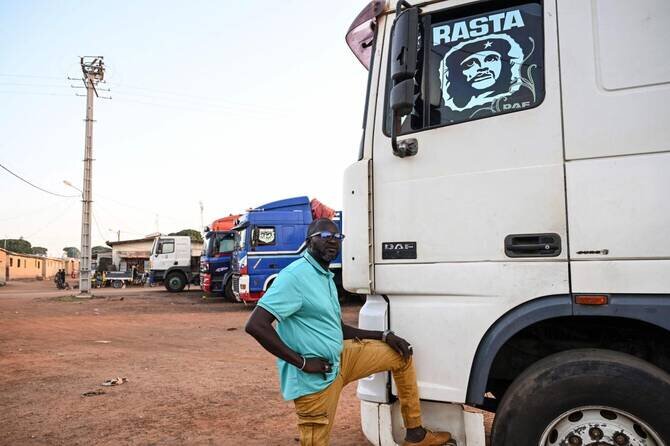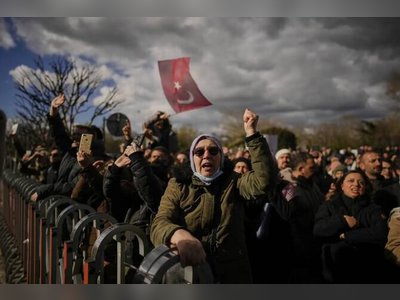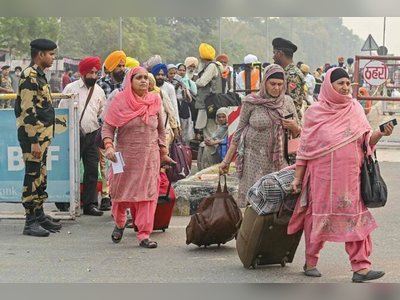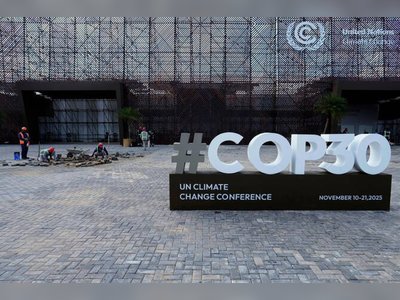
Mali Fuel Blockade: Truckers Defy Death to Supply Militant-Hit Mali with Fuel
Despite threats from militant groups such as JNIM, tanker truckers continue their perilous journey through the region, defying death and fear to ensure that fuel reaches the economically besieged country of Mali.
Tengrela: Tanker driver Baba steel himself for yet another perilous journey from Ivory Coast to Mali loaded up with desperately needed fuel — and fear.
"You never know if you’ll come back alive," he said.
Even before they hit the road, the mere mention of a four-letter acronym is enough to scare Baba and his fellow drivers.
JNIM, the Al-Qaeda-linked Group to Support Islam and Muslims, known by its Arabic acronym, declared two months ago that no tanker would cross into Mali from any neighboring country.
Hundreds of trucks carrying goods from the Ivorian economic hub Abidjan or the Senegalese capital Dakar have since been set on fire.
The JNIM’s strategy of economic militant aims to choke off Mali’s capital Bamako and the ruling military junta, which seized power in back-to-back coups in 2020 and 2021.
The fuel blockade has made everyday life in the west African country all but impossible.
"By economically strangling the country, the JNIM is looking to win popular support by accusing the military government of incompetence," Bakary Sambe from the Dakar-based Timbuktu Institute think tank said.
On top of that, Mali has a "structural problem of insecurity," he added.
Despite it all, dozens of tanker truckers still brave the roads, driven on by "necessity" and "patriotism," they say.
AFP spoke to several along the more than 300-kilometer (185-mile) road between the northern Ivorian towns of Niakaramandougou and Tengrela, the last one before the Malian border.
The truckers express a sense of dying for a good cause.
"We do it because we love our country," Baba said.
"We don’t want Malians to be without fuel," added the 30-year-old in a Manchester United shirt.
Taking a break parked up at Niakaramandougou, Mamadou Diallo, 55, is similarly minded.
"If we die, it’s for a good cause," he confided.
Further north at Kolia, Sidiki Dembele took a quick lunch with a colleague, their trucks lined up on the roadside, engines humming.
"If the trucks stop, a whole country will be switched off," he said, between mouthfuls of rice.
Two years ago, more than half of the oil products exported by Ivory Coast went to Mali.
Malian trucks load up at Yamoussoukro or Abidjan and then cross the border via Tengrela or Pogo, traveling under military escort once inside Mali until their arrival in Bamako.
Up to several hundred trucks can be escorted at a time, but even with the military by their side, convoys are still frequently targeted, especially on two key southern axes.
The truckers have expressed a sense of pride mixed with bitterness over their working conditions, such as no contract, insurance, or pension.
With monthly pay and small bonuses, Yoro, one of the drivers, has called for a risk premium.
Growing insecurity has prompted some Ivorian transport companies to halt road travel into Mali.
In Boundiali, Broulaye Konate has grounded his 45-strong fleet.
Souleymane Traore, an Ivorian trucker, stated that lately "you take to the road with fear in your heart" due to the increasing number of burnt-out tankers he encountered on his way back from Mali.
Malian Prime Minister Abdoulaye Maiga referred to the fuel that manages to get through as "human blood," in recognition of the soldiers and drivers killed on the roads.
"You never know if you’ll come back alive," he said.
Even before they hit the road, the mere mention of a four-letter acronym is enough to scare Baba and his fellow drivers.
JNIM, the Al-Qaeda-linked Group to Support Islam and Muslims, known by its Arabic acronym, declared two months ago that no tanker would cross into Mali from any neighboring country.
Hundreds of trucks carrying goods from the Ivorian economic hub Abidjan or the Senegalese capital Dakar have since been set on fire.
The JNIM’s strategy of economic militant aims to choke off Mali’s capital Bamako and the ruling military junta, which seized power in back-to-back coups in 2020 and 2021.
The fuel blockade has made everyday life in the west African country all but impossible.
"By economically strangling the country, the JNIM is looking to win popular support by accusing the military government of incompetence," Bakary Sambe from the Dakar-based Timbuktu Institute think tank said.
On top of that, Mali has a "structural problem of insecurity," he added.
Despite it all, dozens of tanker truckers still brave the roads, driven on by "necessity" and "patriotism," they say.
AFP spoke to several along the more than 300-kilometer (185-mile) road between the northern Ivorian towns of Niakaramandougou and Tengrela, the last one before the Malian border.
The truckers express a sense of dying for a good cause.
"We do it because we love our country," Baba said.
"We don’t want Malians to be without fuel," added the 30-year-old in a Manchester United shirt.
Taking a break parked up at Niakaramandougou, Mamadou Diallo, 55, is similarly minded.
"If we die, it’s for a good cause," he confided.
Further north at Kolia, Sidiki Dembele took a quick lunch with a colleague, their trucks lined up on the roadside, engines humming.
"If the trucks stop, a whole country will be switched off," he said, between mouthfuls of rice.
Two years ago, more than half of the oil products exported by Ivory Coast went to Mali.
Malian trucks load up at Yamoussoukro or Abidjan and then cross the border via Tengrela or Pogo, traveling under military escort once inside Mali until their arrival in Bamako.
Up to several hundred trucks can be escorted at a time, but even with the military by their side, convoys are still frequently targeted, especially on two key southern axes.
The truckers have expressed a sense of pride mixed with bitterness over their working conditions, such as no contract, insurance, or pension.
With monthly pay and small bonuses, Yoro, one of the drivers, has called for a risk premium.
Growing insecurity has prompted some Ivorian transport companies to halt road travel into Mali.
In Boundiali, Broulaye Konate has grounded his 45-strong fleet.
Souleymane Traore, an Ivorian trucker, stated that lately "you take to the road with fear in your heart" due to the increasing number of burnt-out tankers he encountered on his way back from Mali.
Malian Prime Minister Abdoulaye Maiga referred to the fuel that manages to get through as "human blood," in recognition of the soldiers and drivers killed on the roads.










